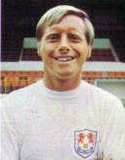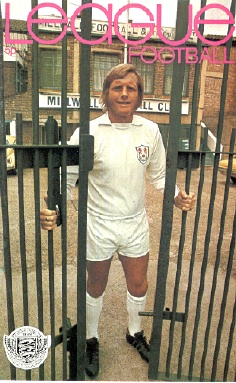
Harry Cripps
If ever a player came to personify the football club he represented then that man was Harry Cripps and the club Millwall.
Millwall Football Club is a name that conjures few pleasant images to anyone outside SE14. The club possesses an image that it may not wholly wish to dispel and which its’ followers positively revel in.
“No-one likes us, we don’t care,” remains the supporters’ anthem even at the bright, modern New Den. Many decades of history and tradition cannot be erased by simply moving to a nice new home.
Although the New Den might give Millwall’s home the appearance of middle class affluence the family inside remain determinedly working class.
In the 1960’s, when Harry Cripps became a resident at the Den, Millwall Football Club was at its’ most unwelcoming. The Den was not the “leave your door open, come in for a cup of tea” vision of the working class. It was the “you’re not from round here, Beware the Guard Dog” kind of place.
For many years Cripps was the scariest guard dog on the estate, fully understanding his job description and carrying out his duties with relish. Visitors were very definitely not welcome and, like all the best guard dogs, Cripps could both smell and instill fear.
Harry Cripps actually started his football career with West Ham United but moved to Millwall in 1961 without having broken into the first team at Upton Park.
West Ham were, and remain, the club most loathed by the majority of the Millwall support so Cripps certainly had everything to prove on his arrival, but it did not take long for the crowd at the Den to take him to their hearts.
In his first season with the club Millwall won the fourth division championship although Cripps was not immediately an automatic first choice. He did, however, make an immediate impression. It was quickly apparent that Harry Cripps was the type of defender who did not like taking prisoners and his preference for keeping things simple did not unduly trouble the regulars at the Den.
After two seasons of struggling in the third division Millwall dropped back into the fourth division which was the signal for the club to launch itself forward into a golden decade. It was now that Cripps became truly established in the Millwall first team and the undoubted hero of the fans. Millwall won promotion in both 1965 and 66, remaining unbeaten at the Den in both seasons.
By the time Plymouth Argyle escaped back to Devon with a 2-1 victory in January 1967 the club had gone a record 59 league games unbeaten at home, winning 43 and drawing 16.
It was not hard to imagine why the team were so strong at home. Everything about the club reeked of inhospitality. Millwall, The Lions, the Den, Cold Blow Lane. It sounded as bleak and unfriendly as it was. The stadium itself was enough to send shivers down the spine of all but the most nerveless opponents.
Cold, basic changing rooms, a tunnel that emerged in one corner of the ground where fans banged menacingly on the high fences strewn, apparently haphazardly, around the steep, solid stone terracing that comprised the stadium.
And then there was Harry Cripps. He also sounded as bleak and unfriendly as he was, on the pitch. Harry Cripps. If you were writing a story about a London gangster that’s what you’d call him. Or an undertaker. Or a butcher. Or a Millwall left back. Perhaps Harry was all those things rolled into one.
He probably looked more suited to any of the other professions mentioned than the one he actually followed. Solidly built, almost square, with broad shoulders, broad beamed and thick, somewhat heavy legs, Cripps was neither quick nor athletic.
He developed a sound positional sense, however, and recognised the moments when he could venture forward at his stiffly brisk canter. Without being particularly skillful or perceptive Cripps sought only to send the ball into dangerous parts of the box or belt an uncomplicated shot at goal. Never striving to go beyond his limitations Cripps became a formidable opponent and played a vital part in Millwall’s rise up the league.
His cult status with the supporters no doubt helped Cripps in his efforts to subdue visiting wingers at the Den. “Harry, Harry, break us a leg. A yard above the knee,” was a popular chant on the terraces when Cripps was playing.
Equally off putting were the manic ape like roars which would accompany his forays forward. It took a brave man to venture within kicking distance of Harry Cripps with the ball at his feet.
A young Francis Lee is reckoned to have listened to the roar greeting Cripps’ entry to the pitch and informed the sturdy defender “I’ll be keeping out of your way,” before trotting over to a safer looking part of the field.
Under the astute guidance of Benny Fenton, Millwall had developed into a capable second division outfit, comfortably maintaining their status for five seasons.
In 1970-71 Cripps was ever present in the league as the club finished eighth and even weighed in, with the aid of penalties and occasional outings in midfield, with ten goals.
The following year Millwall did even better. Going into their final game of the season at home to Preston North End the Lions were in second place, one point ahead of Birmingham City who did, however, have an extra game left to play.
Millwall were two up with only minutes remaining when word got around the Den that Birmingham were losing at Sheffield Wednesday, a situation that would see Millwall promoted.
Cripps saw the scenes of celebration and could not help succumbing to the party atmosphere. It seemed as though eleven years of blood, sweat and tears (mainly his opponents’) were about to be rewarded with a place in the first division.”We’re going up,” he excitedly told the Preston players, who were no doubt happy to see Harry in such a convivial mood. “We’re going to the first division.”
Cruelly, however, the information was bogus. It was Birmingham who had taken the lead and the final whistle brought first confusion and then crushing disappointment.
There was still hope for Millwall, they needed Orient to defeat Birmingham at Brisbane Road and they would still be promoted.It was not to be, however, a late Bob Latchford header giving Birmingham a win and promotion. The club would not come this close again during Cripps’ time.
He was granted a testimonial before the start of the following season with his former club, West Ham, providing the opposition at the Den and his last couple of seasons with Millwall finally saw Cripps enjoy some moderate success in the cups.
In 1973 Millwall reached the fifth round of the FA Cup after a fine 2-0 victory over Everton at Goodison Park in which Cripps scored one of the goals.
There was no disgrace in the 1-0 defeat at Wolves which followed either.
Then the following season Millwall made it to the fifth round of the League Cup before losing 2-1 in a replay against Norwich City, the eventual runners up.
Neither Millwall nor Cripps were really cut out for glamour, however, and both were now passing their peak. In October 1974 Cripps made an emotional exit from the Den and moved across South London to Charlton Athletic.
He would only play on until the end of that season but it was a happy farewell for Cripps as Charlton won promotion into the second division. Cripps would go on to become assistant manager at the Valley and would later hold the same post, briefly, at Southend United, forming an unlikely double act with a certain Bobby Moore.
It is Millwall who Cripps is indelibly linked with, however, and at Millwall that his legend persists. Hard as nails, frequently dirty on the pitch, he was a popoular, roguish character off it and in both guises he was a tremendous servant to his club for over a decade.
The virtues he demonstrated were application, total commitment and the ability to make the absolute most of what he had. Invaluable attributes for anyone but particularly those with limited natural talent.
These qualities caught the eye of Barry Kitchener as he was emerging as a young defender at the Den.
Kitchener, himself no great natural talent, recognised the niche Cripps had made for himself through making the best of what he had as well as, if we’re being honest, the astute use of random acts of violence and he went on to succeed Cripps as the clubs’ defensive lynchpin and the fans’ cult hero.
 Cripps was also fundamental in keeping the Millwall dressing room a happy, positive place. Stories of his practical jokes at the expense of some of the more naive members of the squad, most notably Gordon Hill, remain popular to this day and his own popularity among his teammates survived an unwillingness to submit to defeat in any kind of activity without resorting to blatant dishonesty.
Cripps was also fundamental in keeping the Millwall dressing room a happy, positive place. Stories of his practical jokes at the expense of some of the more naive members of the squad, most notably Gordon Hill, remain popular to this day and his own popularity among his teammates survived an unwillingness to submit to defeat in any kind of activity without resorting to blatant dishonesty.
“A nice cheat,” was how Keith Weller remembered his former teammate. He also reminisced “It was weird, he wasn’t quick but he didn’t get beaten often.” Come on Keith, it’s not that weird. How often did you fancy taking him on in training?
Harry Cripps died of a heart attack in 1995.
Everyone connected with Millwall Football Club mourned his passing with the deepest and sincerest gratitude and respect. His legend shows no sign of diminishing, despite the move to a fancy new stadium.
Harry Cripps Career Statistics
CLUB GAMES GOALS
Millwall FC 400 37
Charlton Athletic 20 4
Total 420 41
